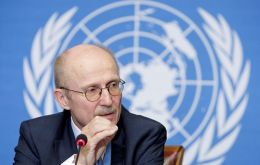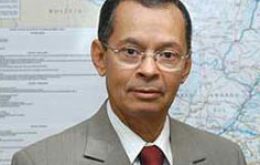MercoPress. South Atlantic News Agency
Brazil
-
Saturday, July 23rd 2011 - 02:05 UTC
Brazil: race and skin colour condition jobs, relations with police and magistrates

Most Brazilians feel that race and skin colour have great influence in labour relations and in the way they are treated by police and the judiciary, according to a report from the Brazilian Geography and Statistics Institute, IBGE.
-
Friday, July 22nd 2011 - 06:24 UTC
Organizing and hosting major sports events deliver a “positive social legacy”

The upcoming World Cup soccer tournament and Summer Olympics in Brazil should be harnessed to deliver a “positive social legacy” for the South American country and beyond, the United Nations envoy for sports and peace has said.
-
Friday, July 22nd 2011 - 06:20 UTC
Brazil: record low unemployment and more job-creation in second half anticipated

Brazil’s unemployment rate fell to its lowest since January in spite of efforts by policy makers to cool growth and inflation in Latin America’s biggest economy. The jobless rate fell to 6.2% in June, from 6.4% in May and 7% a year earlier, the national statistics agency said in a report distributed in Rio de Janeiro.
-
Friday, July 22nd 2011 - 06:09 UTC
Slower truck sales in Brazil hit Sweden’s Scania second quarter profit

Swedish truck-maker Scania controlled by Germany’s Volkswagen, reported second-quarter profit that missed analysts’ estimates as orders in Brazil slowed. Net income in the quarter rose to 2.43 billion kronor (380 million USD) from 2.37 billion kronor a year earlier, the company said in a statement.
-
Thursday, July 21st 2011 - 10:09 UTC
Brazil raises the basic rate to 12.50%, but confident it can tame inflation

Brazil’s central bank announced late Wednesday the fifth straight increase in its benchmark Selic rate by a quarter points to 12.5%, a decision much anticipated by the market and geared to combat high inflation, which is running at a six-year high, 6.75% above the government’s upper target of 6.5%.
-
Thursday, July 21st 2011 - 09:47 UTC
Brazilian cruise industry expects sharp slowdown because of limited port capacity

After growing 20% annually over the past ten years and reaching a level of 800,000 tourists annually, the pace of cruise expansion in Brazil is expected to encounter a sharp slowdown in the 2011-2012 season.
-
Wednesday, July 20th 2011 - 22:21 UTC
Lula da Silva again to the rescue of President Rousseff facing cabinet setback

Former Brazilian leader Lula da Silva said President Dilma Rousseff managed the latest political crisis in the cabinet ‘correctly’ and is proving she has the capacity to lead “in this and in all situations”.
-
Wednesday, July 20th 2011 - 11:22 UTC
Ahead of major international events, Brazil Tourism Board names new president

The Brazil Tourism Board (Embratur) named Flavio Dino, a former federal congressman, as its new president, succeeding Mário Moysés.
-
Tuesday, July 19th 2011 - 13:16 UTC
Northeast Brazil invests in wind energy, operational by December 2012

Denmark-based Vestas has secured an order from a consortium created by Brennand Energia and Companhia Hidro Eletrica do Sao Francisco in the north east of Brazil to supply turbines with a total capacity of 90MW for three wind energy projects.
-
Tuesday, July 19th 2011 - 06:05 UTC
Brazil to cut ethanol content in gasoline to ease pressure on sugar market

Brazil will reduce the ethanol content in gasoline in another effort to contain inflation since sugar (and ethanol) prices because of a poor crop have been soaring, according to the Sao Paulo press.
